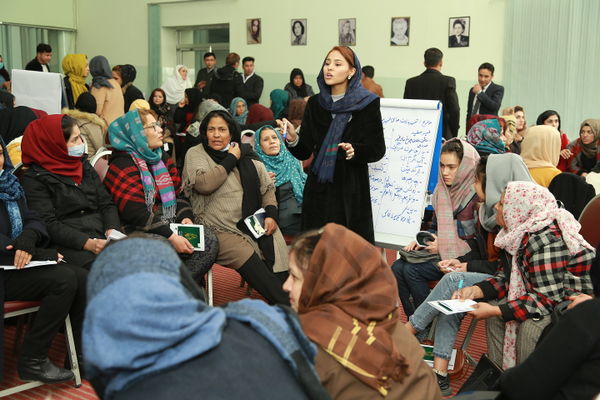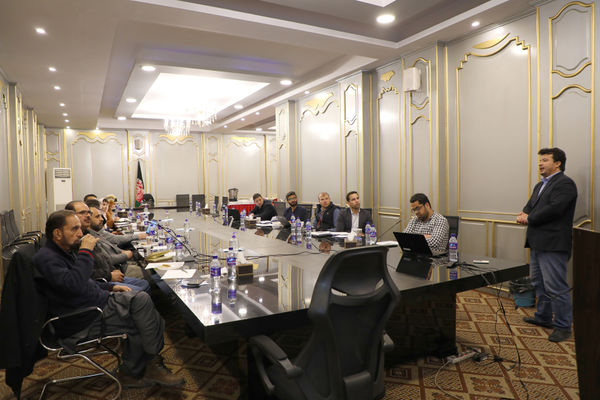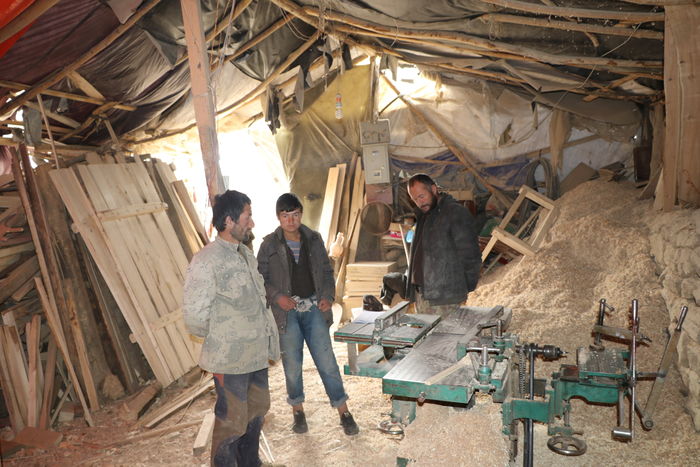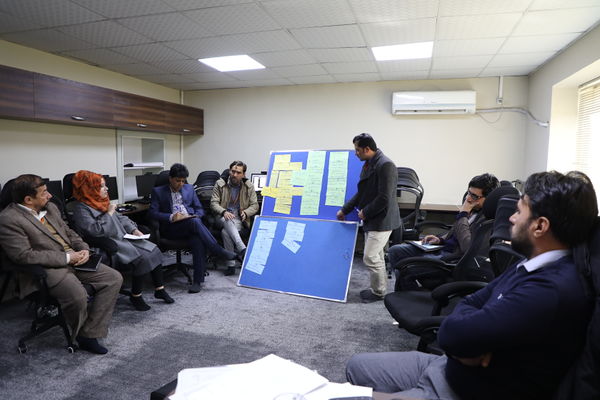Afghanistan Energy Sector Improvement Program (ESIP)
GIZ-ESIP Afghanistan Overview
Energy Sector Improvement Program (ESIP) on behalf of the German Federal Ministry for Economic Cooperation and Development (BMZ). The program aims at promoting renewable energy and energy efficiency in Afghanistan by supporting the Afghan government in implementing strategies for the energy sector. ESIP succeeds the program Institutional Development for Energy in Afghanistan (IDEA), which ended in 2018. ESIP bases its interventions on lessons learnt under IDEA and put explicit focus on establishing a net-metering policy in Afghanistan, supporting the Afghanistan Renewable Energy Union (AREU) to promote private sector involvement in the renewable energy sector and deepening local technical know-how through anchoring a blended learning Masters study course at Afghan universities. Furthermore, ESIP will put mechanisms in place to encourage local economic growth in rural areas through renewable energy technologies..
Output 1 (Public Sector):
The overall objective of the Public Sector component of the ESIP is to improve cooperation between key actors in the Afghan energy sector at central and decentralized levels and to expand the conditions for the promotion of renewable energy and energy efficiency through the implementation of renewable energy and energy efficiency policies, strategies, regulations (e.g., photovoltaic (PV) standards/PV minimum standards, energy efficiency labeling, feed-in tariffs).
The Public Sector component of the ESIP program has supported the Energy Services Regulatory Authority (ESRA), one of the significant Afghan energy sector leading entities, in drafting the Net-metering regulation, which is due to be approved by the cabinet of Afghanistan in 2021. Net metering is a billing mechanism that enables utility customers to efficiently and cleanly generate their electricity. Most solar customers generate more power than they consume during the day; net metering enables them to export that power to the grid and reduce their future electricity bills. Additionally, Public Sector output has supported the ESRA employees with technical training relevant to solar design. As a result, ESRA has now completed feasibility studies of 9 solar governmental projects that sum up to 5MWp. The public sector output is actively supporting the ESRA to operationalize the Provincial Energy Committees (PECs) in all the provinces of Afghanistan, contributing to cooperation improvement between all energy sector actors. The PECs are forums for collaboration between stakeholders on provincial significance matters requiring the Provincial Government and/or National Government and Development Partners to implement an integrated and coherent national energy policy. It further addresses issues related to renewable energy generation, local distribution networks, Energy consumer affairs, Energy Efficiency (EE) measures, and affairs associated with private sector investments like land ownership, water user rights, and security issues. Consequently, as part of the Afghanistan Sustainable Energy Week (ASEW) program, the Public sector has raised awareness of 650 women on renewable energies and energy efficiency topics until the first quarter of 2021. The ASEW aims to raise awareness on renewable energy and energy efficiency topics to up to 3500 people by the end of 2021.

Output 2 (Private Sector):
Output 2 is concerned with improving the energy value chain for imports, marketing, installation, and operation/maintenance. Under this component, the Afghan private sector will increasingly offer end consumers (private households and industry) market-based quality standards/maintenance concepts for photovoltaics and solar thermal energy. This will lead to more investment in renewable energy and energy efficiency which gradually expand the range of renewable energy/energy efficiency options. Additionally, AREU (Afghanistan Renewable Energy Union) one of the key institutions supporting the private sector is advised to expand its range of services to its members including conducting training, workshops, expert pools, and developing an online business directory for the RE-companies with a view to advancing the technical expertise, promote renewable energy through the private sector, and driving forward the market development. Key partners are private sector associations, chambers of commerce, relevant ministries and, international implementers such as ideas-into-energy and BSW (German solar association)..

Output 3 (Academia):
Output 3 is concerned with training academics a distance learning course for technical engineers is on-going. The university education measures aim to increase the number of graduates who have the expertise needed by the Afghan energy market and enable universities and vocational education and training institutions to provide qualified specialists for the energy sector. An expanding energy market with a growing share of variable renewable energy calls for specialists trained to maintain and operate installations. Increase of capacities and placement of qualified / graduated individuals in key positions in the energy sector. Key institutions in the Afghan energy sector e.g. Da Afghanistan Breshna Sherkat (DABS), the Ministry of Rural Rehabilitation and Development (MRRD)have signed on-the-job training (OJT) agreements with 400 employees. focuses on training technical and management professionals in the energy sector. the key partner institutions are DABS, universities, vocational schools and training centers and international implementor such Beuth University.
Output 4 (Rural Electrification):
Output 4 introduces and implements efficient technical approaches and concepts to boost the productive use of renewable energies in micro and small enterprises (MSEs) in rural areas, mainly by implementing renewable energy systems and provide modern and energy-efficient business appliances to SMEs. Under this output, “Renewable Energy Survey Tool” was developed and this tool is currently being used in “Village Renewable Energy Survey” as the main ongoing activity of this output in Badakhshan, Takhar, and Bamiyan provinces to identify potential locations for increasing the productivity of SMEs. Survey of 35 communities/villages, data collection of 193 communities/villages, a survey of 43 SMEs, technical survey of 627 MHPs, and basic technical assessment of 225 MHPs in Badakhshan and Takhar provinces were the major activities under this component.

ESIP General PR
PR is responsible to coordinate and facilitate PR unit activities in line with the overall program objectives and Contribution to the overall program goals and objectives. PR is trying to make a good communication between the pillars and facilities the relationship between ESIP and partners/stakeholders. PR Assist in preparing reports, communication products newsletters, research summaries, reports, info graphics and publications including flyers, posters, leaflets, booklets, posters, brochure, banner, booklet, magazine, factsheets, and Poster such Renewable Energy Information Materials posters to show how people use the renewable energy systems. PR also write and publish the article, press release, summery sheet, success story in German Cooperation social medias pages and support the ESIP by making the presentation, taking photos and videos from the events/ workshops/training and, making short video clip, etc. PR also is responsible for information sharing of PR issues with team members and updating the PR materials and data in Data management System (DMS) and energypedia page.
File:ESIP- Establishing the Solar PV Market in Afghanistan-Article- Feb 2021.pdf
File:Mid-Term Review- Youth and Private Sector-19-21July 2019.pdf
File:ESIP- Press release- Sixth Renewable Energy Coordination Committee (RECC), March 2019.pdf
File:ESIP- Press release- Promoting Afghan Energy Production- Apr 2019.pdf
File:ESIP- Press release- RE From Green Dream to Economic Driver Workshop-19Dec 2019.pdf
File:ESIP-Article - Youth Entrepreneurship Support II (YES) II Program- Nov 2020.pdf
File:Article- Digital Marketing Strategy Workshop for AREU Members- Oct 2020.docx
File:Afghanistan ESIP- Development of RE-EE Master Degree Program-2021.pdf
ESIP General M&E
M&E is responsible to assess, monitor and evaluate all ESIP activities from start to the end. M&E officer is also update and follow up ESIP monitoring tool which include: monitoring plan, activity progress, analysis of impact of each activity, updating the data in Data Management System (DMS), updating monthly impact monitoring sheet, updating the data in German Development Tracker for Afghanistan (DevTracker) and, result matrix values and indicators. M&E also responsible to assess how much each pillar achieve its objectives, the progress, outcome and over all condition of ESIP based on the project indicators and planned activities.




















